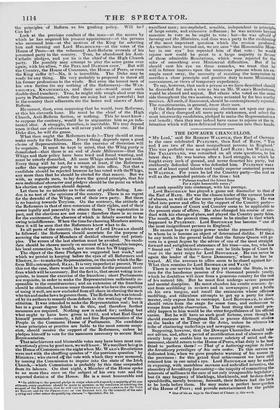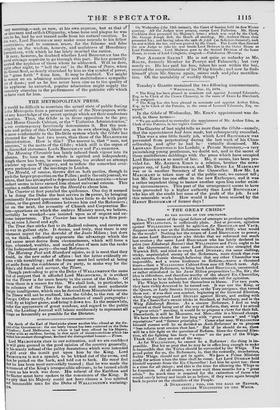THE DOWAGER CHANCELLOR.
" MY Lord," said Sir ROBERT WALPOLE, then Earl of ORFORD to the once celebrated PULTENEY, then Earl of BATH, " You and I are two of the most insignificant persons in England." This was perfectly true as regarded Lord BATH; but WALPOLE, like TALLEYRAND, was consulted on all state questions, to his latest days. He was beaten after a hard struggle, in which he fought every inch of ground, and never deserted his party, but stubbornly defended those who defended him. PULTENEY wasa man of' at least equal talents and vastly superior oratorical powers to WALPOLE. For years he led the Country party—the real as well as the pretended patriots of the time : but
" Pulteney trucked the fairest fame
For a right honourable name ;"
and sunk speedily into contempt, with his peerage.
Lord BROUGHAM has played a game not dissimilar to that of the Earl of BATH. He was the chosen leader of the earnest haters of abuses, as well as of the mere place-hunting Whigs. He was lifted into power and office by the support of the Country party— for the old names of Court and Country seem to be applicable to the present state of affairs. He also changed his course of con- duct with his change of place, and played the Country party false.
The result, at the present time, seems to be similar to that which happened to PULTENEY. Lord BROUGHAM has become " one of the most insignificant persons in England."
He cannot hope to regain power under the present Sovereign, to whom he is become an object of determined dislike. If thee be any truth in the general belief that the future Queen will go vern in a great degree by the advice of one of the most straight forward and enlightened statesmen of his time—one, too, who has " found out " the trickster—there can be little hope of Court fa year in the next reign for Lord BROUGHAM. He can never be again the leader of the " fierce Democracy," whom he has be trayed. Al: the avenues to office seem to be closed against hir . What then remains for Lord BROUGHAM and VAux?
There is one service which he may yet render the State, in re- turn for the handsome pension of five thousand pounds yearly, which he doubtless will draw from a generous country for the rest of his natural life. But he must first undergo severe penance and mental discipline. He must abandon his erratic courses; de- sist from scribbling in reviews and in newspapers ; put a bridle on his own tongue, and recall the emissaries whose officious meddling, and ridiculous attempts to get up a party for their master, only expose him to contempt. Lord BROUGHAM, in short, should retire from the stage for some time, and endeavour to escape from public observation. The best thing that could pos- sibly happen to him would be the utter forgetfulness of his official career. But he will have no such gcod fortune, even though h. should rusticate at Brougham Hall, or pursue dilettanti studies on the banks of the Tiber or the Arno, unless he silences his- tribe of chattering underlings and newspaper organs. Supposing, however, that the Dowager Chancellor should take our advice, and, after a period of mortification and of absence suffi- ciently long to enable him to recover sobriety of mind and de- meanour, should return to the House of Peers, what duty is he best fitted to perform there? — That of a battering-engine to level the hereditary privileges of his own order. To this service we dedicated him, when we gave prophetic warning of his career in the provinces : for this grand final achievement we have still retained him in our mind's eye. Lord BROUGHAM may be useful in exposing, with matchless sarcasm and unbridled invective, the absurdity of hereditary lawmaking—the iniquity of committing the interests of millions to the care of not only irresponsible legislator-, but (it may happen) of blacklegs, blockheads, and broken-down spendthrifts, merely because, forsooth, their fathers had the luck to be lords before them. He may make a perfect bear-garden of the House of Peers ; and provide entertainment for the public • One of his sa togs in the Court of Chaucc 7, this week. very morning,—not, as now, at his own expense, but at that of le ignorant and selfish Oligarchy, whose bane and plague be was orri to be, had he not turned aside from his natural vocation. In Os way, Lord BROUGHAM may make some amends to his fellow countrymen, and to common sense, for the fulsome and false eulogies on the wisdom, honesty, and usefulness of Hereditary Lawmakers, with which lie has lately insulted the nation. It may, however, be doubted whether Lord BROUGHAM has the moral courage requisite to go through this part. He has generally courted the applause of those whom he addressed. Will he dare, night after night, to " bell the cat" in the House of Peers, when the Great Seal, so dearly cherished by him as the symbol of power, has " gone forth"* from him. It may be doubted. Yet might be count on an admiring audience and multitudinous sympathy out of doors; and as he has never been nice as to the quality of the applause he extorted, popular admiration might supply the necessary stimulus to the performance of the patriotic role which we have cast for him.





















 Previous page
Previous page